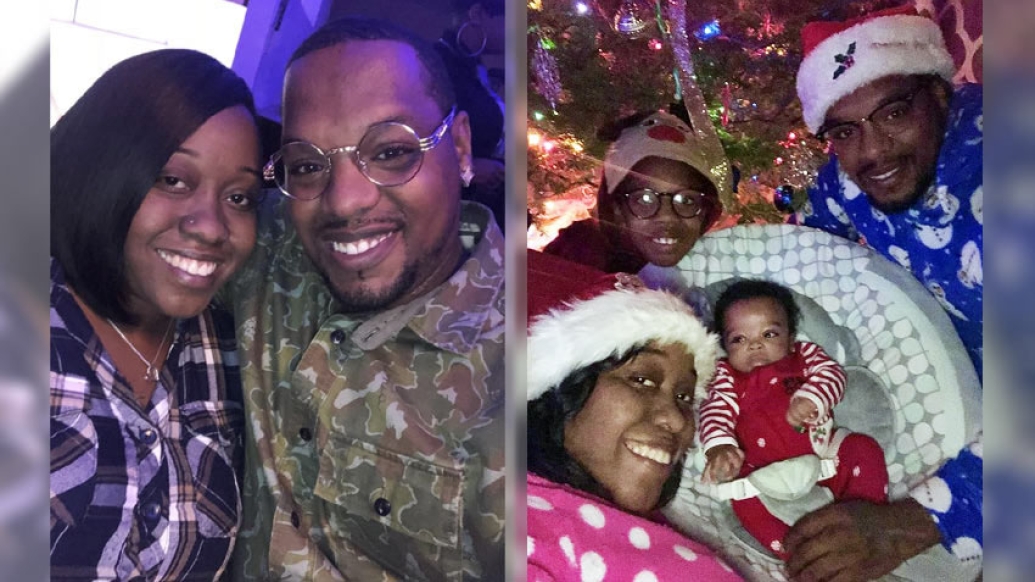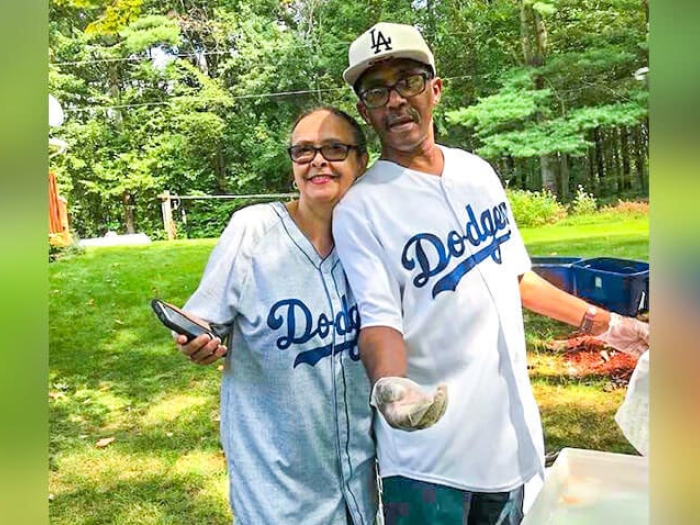A high-risk patient receives a monoclonal antibody treatment months before her due date.
5:00 AM
Author |

When the COVID-19 pandemic first started, 34-year-old Yolanda Roberson knew that both she and her husband, Deandre, needed to be extra careful.
"I work in the customer service department of a mortgage company, which helps people who may be struggling with their monthly payments," she says. "And my husband works for a large distribution company, which naturally puts him at a higher risk for COVID exposure."
So when Deandre contracted the virus in early December, the two of them quickly made household adjustments to keep him quarantined while the rest of their family remained safe.
"At the time, I was pregnant, and we have another baby who is just 18 months old, as well as three other sons," says Yolanda. "I was considered high risk for COVID-19 because of my pregnancy, but also because I am a transplant recipient."
Yolanda received a liver transplant at Michigan Medicine in January of 2013 due to autoimmune hepatitis, a disease that inflamed her liver. While she was diagnosed with the condition back in high school, it took many years of hospital visits before doctors realized just how bad it really was.
"For a long time, I was in and out of hospitals," she says. "At one point, I was completely jaundiced – it was very scary. But on Christmas Day of 2012, I was very sick and nauseated and went to Michigan Medicine seeking help."
MORE FROM MICHIGAN: Sign up for our weekly newsletter
At that point, Yolanda had already been seeing a team of experts, including Robert Fontana, M.D., Michigan Medicine's medical director of liver transplantation. And he knew that Yolanda's situation was dire.
"Her condition was very severe," says Fontana. "She was on the brink of complete liver failure so a transplant was necessary. When we were able to perform the surgery, I knew that this would be life-changing for her."
Yolanda adds that after she received the liver transplant, she began physical therapy at home and continued to see Fontana on a regular basis to maintain her health.
"Because of my pregnancy and previous liver transplant, the thought of contracting COVID-19 was very scary to me," she says. "But even after my husband safely quarantined in our household for 14 days, I wound up getting it."
At first, Yolanda didn't have any notable symptoms. But after returning home from Christmas shopping the day before Christmas Eve, Deandre told her that she looked slightly off.
"I had been running around, preparing for the holiday and thought my fatigue was simply because I had been pushing myself to shop and decorate for our family," she says. "But that day, my husband urged me to take my temperature because I appeared ill. If he hadn't said something to me, I wouldn't have thought twice about the way I was feeling in that moment."
Deandre was right. Yolanda's temperature was over 100 degrees Fahrenheit.
"I quarantined myself that night and the next morning, on Christmas Eve, I went and got tested for COVID-19," she says. "When I found out it was positive, my heart was broken. I couldn't enjoy Christmas with my family and my birthday is on New Year's Day, so I basically knew that my holidays were going to be spent alone."
Because Yolanda was pregnant, she was already in constant contact with her doctors regarding her health, including Fontana.
Not only was Yolanda's life important to us, but also her unborn baby's.
"I informed them that I had COVID-19 through Michigan Medicine's patient portal and because I'm also diabetic, they made sure to regularly check on me," she says. "Soon after, Dr. Fontana called me about receiving a monoclonal antibody treatment, which would help ensure that I remained healthy given my medical history."
According to Fontana, Yolanda was the perfect candidate for this cutting-edge treatment.
"When we first talked about her positive test result, I was worried because she had just been to the hospital and she was newly pregnant," he says. "She was also on a lot of medications and is a liver transplant recipient who has diabetes. Naturally, these are all worrisome factors from a medical perspective for someone with COVID-19."
Fontana then quickly contacted the Michigan Medicine infectious disease team to approve access to the monoclonal antibody treatment for Yolanda.
"Once we had approval, she was the first pregnant patient that we treated through this type of infusion," he says. "Because of the level of concern surrounding her health, we pushed the envelope to get her treated quickly with this drug. You only have 10 days to administer the monoclonal antibodies upon contracting the virus, so the clock was ticking as we creeped up on day four and five."
Like Podcasts? Add the Michigan Medicine News Break on iTunes or anywhere you listen to podcasts.
Fontana notes that after the treatment was administered on time, Yolanda's condition significantly improved.
"In high risk cases, you can never be too careful. It was a joy to see her fever break and breathing improve upon receiving the monoclonal antibody treatment," he says. "Not only was Yolanda's life important to us, but also her unborn baby's."
And now that Yolanda is completely free of COVID-19, her future looks bright.
"Spending time with my family has always been my priority," she says. "This whole experience reminded me that I am in a very vulnerable population, which can be scary. But at the same time, having gone through all of this is pretty empowering. I'm strong and in July, I can't wait to welcome our baby boy. Together, we will make it through."

Explore a variety of healthcare news & stories by visiting the Health Lab home page for more articles.

Department of Communication at Michigan Medicine
Want top health & research news weekly? Sign up for Health Lab’s newsletters today!





